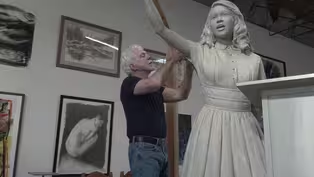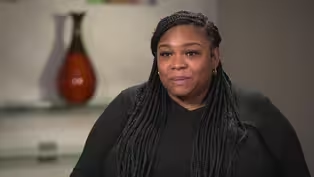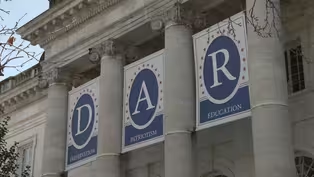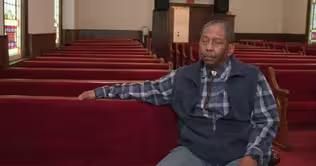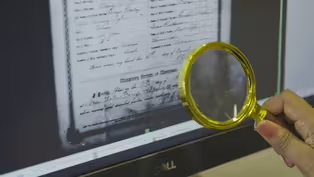VPM News Focal Point
Addressing Racism in Schools
Clip: Season 3 Episode 5 | 10m 52sVideo has Closed Captions
Deone Allen calls for the School Board to take action to remedy children being mistreated.
Deone Allen spoke at length with VPM News Focal Point this week, saying that families have reached their limit and will no longer tolerate their children being mistreated. She is calling for swift and serious consequences for students who subject others to verbal attacks and for the school board as well as the community to take decisive action to remedy the problems.
Problems playing video? | Closed Captioning Feedback
Problems playing video? | Closed Captioning Feedback
VPM News Focal Point is a local public television program presented by VPM
The Estate of Mrs. Ann Lee Saunders Brown
VPM News Focal Point
Addressing Racism in Schools
Clip: Season 3 Episode 5 | 10m 52sVideo has Closed Captions
Deone Allen spoke at length with VPM News Focal Point this week, saying that families have reached their limit and will no longer tolerate their children being mistreated. She is calling for swift and serious consequences for students who subject others to verbal attacks and for the school board as well as the community to take decisive action to remedy the problems.
Problems playing video? | Closed Captioning Feedback
How to Watch VPM News Focal Point
VPM News Focal Point is available to stream on pbs.org and the free PBS App, available on iPhone, Apple TV, Android TV, Android smartphones, Amazon Fire TV, Amazon Fire Tablet, Roku, Samsung Smart TV, and Vizio.
Providing Support for PBS.org
Learn Moreabout PBS online sponsorshipANGIE MILES: I'm here with Deone Allen, who has children who attend Powhatan County schools and they've been attending for several years.
Thank you for being with us today.
DEONE ALLEN: Yes.
Thank you.
ANGIE MILES: So what compelled you to go before the school board?
What did you want to share with them about your children's experience?
DEONE ALLEN: I wanted them to know what we've experienced.
I was just one of many.
My son was actually told by another, by a white child that he was talking about my son and my son was like, “You shouldn't talk about people behind their backs.
” And the child said, "Well that's my right."
And he said, "You can't try to take away my rights.
I should be the one taking away your rights like we did back in the day."
My son has been told that his hair looks like jungle vines.
He has dreadlocks.
He's been told his hair is weird.
It's dirty, it's ugly.
Why do you wear your hair like that?
Nobody wears their hair like that.
The N-word with both the -er and the -a at the end he's been called.
ANGIE MILES: When people hear how often the name calling and the harassment has occurred, do you feel that that is just the tip of the iceberg?
DEONE ALLEN: Yes.
ANGIE MILES: Is there much more going on?
DEONE ALLEN: I feel that at this time right now, that there's enough people that don't feel like they have to continue to deal with this in silence.
So that is why all the things are being shared.
You know, like even at the school board meeting when I did say the whole word, because my child has to hear the whole word whether he's being called it or another student.
So, I don't see why I should need to censor it in a room with adults because you need to know exactly the feeling when that word is said and it's disrespectful and it's there's, it should not be used.
I do think that there are still a lot of kids that haven't spoken up and there are probably even worse stories or just equal- I mean they're all bad.
None of it is good.
ANGIE MILES: As a person who grew up in a state south of Virginia, do you feel that the racism is worse here?
DEONE ALLEN: I will definitely say that, I hear it here.
I know it happens.
We know it happens everywhere, right?
I mean like we know it happens.
We know that there are people that feel certain ways, they were raised certain ways, but the amount- I have never in my entire life heard it like I hear it now.
ANGIE MILES: Would you be more inclined to say that Powhatan is a racist community or would you be more inclined to say there are a lot of people who may be racist operating with impunity in Powhatan?
DEONE ALLEN: So I'm not going to say Powhatan is a racist community because I've had a very positive experience here and for the most part people are very nice.
It's a tight little community.
But I will say that there is a lot of condoning of behavior that's bad.
There's a lot of just, “Well, I don't see it, so it's not happening.
” And that is the problem.
ANGIE MILES: Apart from people not paying attention or walking away or saying, I don't see that.
Is there a reason why maybe so many children in our schools feel emboldened to be able to say whatever they want to people of color or people who are maybe LGBTQ or who are different in some way?
Who- DEONE ALLEN: Yeah.
ANGIE MILES: Who's doing this taunting and why do they feel like it's fine to do it?
DEONE ALLEN: I don't know why they feel like it's fine to do.
I do think there's a lack of, of enforcement of the rules that are clearly there, that are, that prohibit harassment, prohibit racism, prohibit prejudices.
I think that there are clear rules in place that say the schools will not tolerate that behavior, but that is not being enforced on a regular basis.
And I will also say this, and I know that we're growing up in a very different time where there's a lot of access to things that children are not aware of.
Like for example- or parents may not be aware that their children are accessing.
So for example, the incident that we had with the student that made the comment about taking away my son's rights, I spoke to that child's parents and that child's parents were totally shocked and appalled that their child did that.
And I don't think that those parents taught that child that, but someone did.
He got it from somewhere, where, was it social media?
Was it a friend at school?
I don't know, but it came from somewhere.
So I'm not even going to always say that it's the parents that are doing it.
But our kids have access to a lot of things and as a parent though, we are responsible for them.
So I don't know where it's coming from, but I know it is tolerated too much here.
ANGIE MILES: As a parent whose child has been affected by this, what do you do to help your child be okay and not traumatized by being accosted and harassed at school in this way?
And what do you want to see the school, the administration, the board do in response?
DEONE ALLEN: The first thing is that we talk to them probably like way more than we did before.
Like as far as asking them every day what happened at school, how was school today?
You know, I also tell my son, "If something happens that makes you uncomfortable, text me, let me know, because I don't want to find out at the end of the day if you're not feeling comfortable during the day."
I think that every incident should be raised.
It should not be tolerated because too many times thats happened.
And then as far as, I would just want administration to enforce the rules, protect the kids.
That's what the rules are there for all the kids.
Even if it's a biracial child or LGBTQ child, like protect the kids, they should feel safe at school.
They should not have to come and deal with that.
Mentally, it interferes with their education.
That's my other concern.
How can you focus on school if you're concerned about, you know, getting called names and it's already enough that they're different and it's not a lot of them, but then it's just magnified when they're disrespected.
ANGIE MILES: Some of the school board members at the recent meeting spoke and said it starts in the home.
It's music they're listening to.
It's other influences outside of the school building.
What can we do about that?
But is it fair?
Is there, do you give them a little leeway in that kids do live in a complex world and we can't monitor and control every single influence?
DEONE ALLEN: Oh, okay.
So when that comment came out, I just shook my head because I felt like they stepped farther and farther away from their position and their job in that moment.
And here's the thing, absolutely kids are exposed to things you can't control, but it is not your job to control what they're taught, but you can enforce the rules that are in place, the discipline that is a available to you in place for when things, when rules are broken, you don't tolerate it.
It's just like I can have someone come to, I can have an unruly child come to my house, but you're going to respect my house or you're going to leave.
Why doesn't that happen at school?
I'm not trying to retrain and raise that child, but you're going to respect my home.
And that's all we're asking to happen at school.
ANGIE MILES: If people understand that there are are consequences and they are enforced and they are equally enforced, consistently enforced- DEONE ALLEN: Yes.
ANGIE MILES: Then maybe there won't be so many of these issues.
DEONE ALLEN: Yes.
ANGIE MILES: Is what you're saying?
DEONE ALLEN: Yes.
ANGIE MILES: What about the board itself?
What do you want them to do in addition to enforcing the existing rules?
Is there more, is there some education that needs to happen that's not happening?
Is there some social emotional thing that maybe you feel the schools are stepping away from that they shouldn't?
DEONE ALLEN: If there's a clear issue, you have numerous reports of racist activity happening, educate children, stop trying to take history out of schools and stop trying to take education about, you know, transgender students or LGBT, all these things.
Stop trying to remove it.
It's where we are.
So educate, respect the boundaries, and the protection of those students and move on.
ANGIE MILES: Outside of the school setting, do you feel there are things that the community might be able to do that would help stem the racially charged comments that would make things more harmonious in Powhatan?
DEONE ALLEN: I do.
I, as I said at the school board meeting this week, that was the most diverse setting I've ever been in, in Powhatan.
And I think if more settings in Powhatan look like that, then we wouldn't be where we are right now.
So, I think that we need to come together as a community because we are supposed to be that tight-knit community.
And I feel like that most of the time, except for with this issue.
ANGIE MILES: Could this very difficult moment in Powhatan become a breakthrough moment for race relations?
DEONE ALLEN: It absolutely can.
It absolutely can.
But it's going to be on each individual person to uphold their part in that.
Even after the school board meeting, I'm still getting messages from people, “Oh my gosh, I just watched back the school board meeting.
Thank you for your comments.
” Like, “Help me to understand, you know, I have some questions.
” You know, from my friends that don't look like me.
And I appreciate that.
I am always open for conversations and dialogue, but what I don't feel like it's a place for is people can continuing to say, "Well, I don't see it."
Well stop trying to look through your lens and listen to other people's.
ANGIE MILES: Okay thank you very much for spending time speaking frankly about these issues.
This is Deone Allen we've been talking with, a parent in Powhatan County who's been addressing the issues of racial conflict here in the county.
Civil Rights Figure Gets a Step Closer to the U.S. Capitol
Video has Closed Captions
Clip: S3 Ep5 | 2m 12s | Teenage civil rights figure is one step closer to her place in the U.S. Capitol. (2m 12s)
Combatting Black maternal health disparities
Video has Closed Captions
Clip: S3 Ep5 | 4m 27s | Doctors at Eastern Virginia Medical School focus on improving Black maternal health care. (4m 27s)
Diversity is top priority for new DAR leadership
Video has Closed Captions
Clip: S3 Ep5 | 3m 19s | DAR makes diversity a top priority as chapters welcome descendants of “Forgotten Patriots. (3m 19s)
Exploring what it means to be Melungeon
Video has Closed Captions
Clip: S3 Ep5 | 6m 57s | Melungeons are an ethnic group of mixed ancestry with roots in Appalachia. (6m 57s)
Video has Closed Captions
Clip: S3 Ep5 | 7m 30s | With the help of at-home DNA tests, many are discovering stories hidden in their ancestry. (7m 30s)
Providing Support for PBS.org
Learn Moreabout PBS online sponsorship
- News and Public Affairs

Top journalists deliver compelling original analysis of the hour's headlines.

- News and Public Affairs

FRONTLINE is investigative journalism that questions, explains and changes our world.












Support for PBS provided by:
VPM News Focal Point is a local public television program presented by VPM
The Estate of Mrs. Ann Lee Saunders Brown
